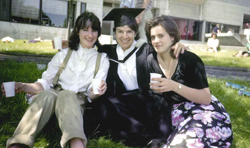Interviews

Name: Teresa Raftery
Degree/Masters: B.A. (1983)
Teresa (pictured left with her daughters) came to Trinity as a mature student in her 40s. Her novel The Web and the Wing is now available.
You came to Trinity as a mature student having raised a family. What motivated you to pursue your studies and why did you choose philosophy as your subject?
The answer is 'something in my psyche'. I was almost seven, living five miles from Manchester, when the Luftwaffe bombers began their blitzing of that city. I now regard it a privilege to have lived through the Second World War because, actually witnessing the atrocities of war; knowing that Adolph Hitler was planning to invade England; living with threats and dangers at the time of their occurrence, not knowing whether they will, or will not, come to pass, awakens a far greater awareness of the actual brutalities and horrors of war, and impacts more deeply on the soul than simply reading about them seventy years later. My novel The Web and the Wing aims to takes the reader through the good and the bad of that period as if he also were living through and learning about events as they occurred, thus allowing him to form his own opinions, without any comment or judgement from the author.
What did you find most challenging about being a student as a person in your 40s?
With one big exception, I did not find it challenging. I found it both satisfying and stimulating. The big exception that challenged me was 'Logic'. Being an essential subject for many disciplines, the class was huge. Failure to pass the 'end of year' exam meant dismissal. Detesting algebra when at school, I had given it scant attention, always relying on my beloved geometry to pull my maths up to a good average, and now - twenty seven years later, Logic!, not merely challenging but downright daunting, actually expecting me to reduce sentences to algebraic form and then prove their validity, or otherwise, from an equation!
What did you like most about being a student and was there anything you disliked?
What I liked most about being a student was the bliss of entering the library knowing I would be undisturbed for the next two to three hours. It was in stark contrast to the work awaiting me on reaching home where the tasks of running a large establishment, the family, an old Georgian house, grounds and gardens and breeding flat-racers, were ongoing. You ask what I disliked. Having thought long and hard, the answer is 'nothing' - except of course, the Logic - but gaining a 'First in the exam and what it had taught me about 'soldiering on', more than made up for the difficulties.
Who were your fellow students? Did you maintain links with any of them?
My fellow students were all lovely, bright young school-leavers, who accepted me as one of them and would seek me out when going to the pub. Their company was wonderful.
Which people, if any, produced an impression on you while a student in Trinity?
The lecturers impressing me most were David Berman and Ross Skelton. I very much appreciated the patience and very attentive listening of David Berman. Even when the topic for which I was seeking help was not on the curriculum, his thoughtfulness always succeeded in providing answers and suggestions to serve my individual research. Ross Skelton was a psychologist from whom I learned a great deal about life in general, including the analysis of problems and also methods of arriving at their solutions. A skill/technique taught by Ross was, when involved in an argument always listen closely to the sound of the other person's voice. The words will go in anyway, but the sound and tone of the voice will tell you what the person is feeling, be it fear, anger, confusion or whatever, the knowledge of which will be a good indication of how to proceed.
How did your being a student change the nature of your relationship with your children? Were any of them at the University at the time you were a student?
Being at Trinity did not change in any way the nature of my relationship to my children. They appeared to look upon it little more than another instance of Mummy doing 'her thing', while they did theirs. They were very supportive. My eldest daughter graduated with honours from Trinity, the same year that I began. The middle three were in higher education and the youngest was still at school.
What did you do after you graduated?
After leaving Trinity I was swept away in catching up with aspects of my life I had neglected. I ceased breeding racehorses, keeping only the riding horses, mine and the children’s. I then applied for planning permission on a portion of land no longer needed and a year later commenced my research for The Web and the Wing. Strangely, my degree meant little to me at first. Only as the years went by did I begin to value and appreciate having achieved it.

